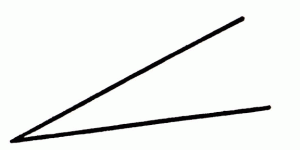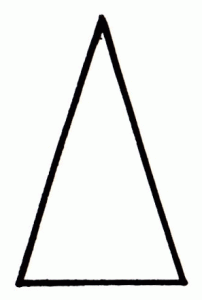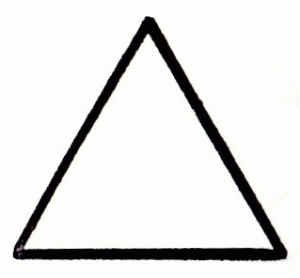
 |
| Guillevic |
The great French poet Guillevic has been a personal favorite of mine ever since I came across Denise Levertov‘s translation of his Selected Poems in 1970 or ’71. I’ve read Englished volume of his, I think, and only one failed to capture my imagination, the sequence published by Unicorn Press under the title Euclidians; as translated by Teo Savory, the poems struck me as a bit loose-jointed, somehow overly relaxed. Besides, I’m terrible at math, and each poem either addresses or is written in the voice of a particular geometrical figure—so the collection felt like an exercise.
Luckily, Richard Sieburth had some of the same feelings about Savory’s versions and undertook to retranslate the sequence, which Ugly Duckling Presse published last year in its Lost Literature Series. Sieburth gave the book a decidedly less pedantic title—Geometries—and translated its 42 poems into extremely concentrated, elemental verse that feels like the “real” Guillevic, at least as I hear him through the distortion-screen of my own language.
Here are a couple of examples:
Acute Angle
Failing to make it
As a circle,One can always
Become an angle.Failing to live
At peace with yourself,You might as well
Attack your surroundings,And then get some rest
While you dreamOf closing
Your far side,Forever open
Onto the unknown.
Guillevic also exploits the transformational aspect of these figures, as when he places two different triangles in sequence:
Isoceles Triangle
I have succeeded
In putting myself in order.I tend to find myself
Quite pleasing.
Equilateral Triangle*
I have gone too far
In my need for order.Nothing more can happen here.*
On the back of this edition, Pierre Joris notes that “[as] Englished by Richard Sieburth[,] these gems have kept all their Gallic lightness and grace.” He’s right. And couldn’t we all use a little more lightness and grace?
__________________
* This version is an example of why I enjoy having multiple translations. Teo Savory renders the poem in a slightly more interesting way:
Equilateral Triangle
I have gone too far
with my obsession for order.
There’s no future in it.




 Joseph Hutchison, Colorado Poet Laureate 2014-2019, has published 20 collections of poems and edited or co-edited three poetry anthologies. He currently directs two master’s-level programs for University College at the University of Denver: Professional Creative Writing and Arts & Culture Management. Joe lives with his wife, Melody Madonna, in the mountains southwest of Denver, Colorado, the city where he was born.
Joseph Hutchison, Colorado Poet Laureate 2014-2019, has published 20 collections of poems and edited or co-edited three poetry anthologies. He currently directs two master’s-level programs for University College at the University of Denver: Professional Creative Writing and Arts & Culture Management. Joe lives with his wife, Melody Madonna, in the mountains southwest of Denver, Colorado, the city where he was born. 










I have been a big fan of Guillevec's since the 70's and it inspired me to write a whole sequence on numbers published in Iron Magazine UK – helped kick off my poetry writing career with a bang. Wonderful memories reading his stuff in the Poetry Library on London's SOuthNabk poerty library. Thank you 🙂
I've been reading Guillevic's _Art poétique_ Black Widow Press, Boston, 2009, He seems so minimalist: one very distilled or condensed poem can say so much, it's amazing. I like these geometric poems you posted. They seem a bit humorous but not frivolous.
A wonderful post, Bob—and thanks for the link! I like your observation that writing at length on such short poems seems illogical; but of course it isn't: the number of words has little to do with the imaginal space they create!
I much appreciated your blog on Guillevic, one of the great poets of the latter half of the 20th century. I read much of Guillevic in French and had the pleasure of meeting him once, though he would not have known who I was. I've just posted a blog referring to Guillevic and link to your post. http://bonxie.wordpress.com/ Many thanks.
pee est:<br /><br />"comedy" back in Dante's time didn't have the same meaning that it has now…<br /><br />I mean, he didn't title that poem<br /> <br /> The Devine HA HA HA, I Slipped on a Banana Peel<br /><br />you'll most likely find that Dante was provoked by a cute, young girl….. who rejected him<br /> so, he went into his studies … entirely<br /><
ahhhh…<br />an 'enso' is a "perfect", "empty" circle<br /> one meditates upon<br />it is also<br /> for me<br /><br />the circumference that surrounds/contains everything<br /><br />like, in mathematical terms is that 'thing' in set theory<br />that contains, embraces all the "sands-of-time"<br /> <br />
"Cthonic" means "from underground"—a half joke, really. Stone Girl? Hmm?<br /><br />Maybe it's a romantic-spiritual comedy…<br /><br />I don't know, I've been trying to think about how to talk about the book. You write (and draw) in ways that make talk beside the point. (A good thing.) And I'm not up to something along the lines Conrad does in his intro. I
just might be…I don't know much about this "Religious 'stuff'". My brand of Religion is a ….mish-mash catch-me-if-you-can type of thing: any way::<br /><br />what's "cthonic" ? is this "athonic" as those Greek Orthodox monks who live in monasteries high up?<br /><br />maybe "avatar" in the 'true' sense of the Hindu meaning
Speaking of plinths, I've suddenly begun to think of Stone Girl (I'm in volume 4) as a cthonic avatar of the same light-borne whatever-we-call-it at the center of Samperi's work. May be just a passing fancy….
NEAT… a poet with a sense & humor..<br /><br />his line (as it s translated one way ( "Nothing more can happen here."<br />reminds me of a re:ply to a letter from (^#@ *^&%#!)<br />years ago I wrote:<br /><br />"noh-thing much happens here, either."<br /><br /><br />moochouse grasses for the intro to Guillevic<br /><br />will look for the Levertov translations … as